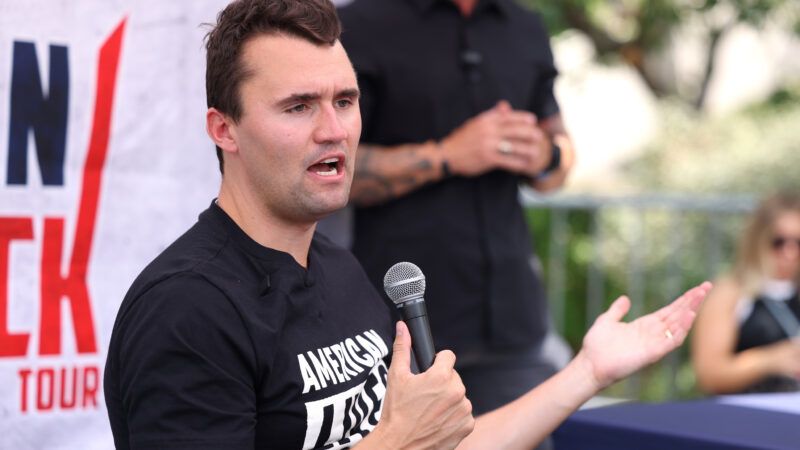Charlie Kirk, Who Became a Media Titan Because He Wasn't Afraid of Disagreement, Assassinated at 31
The pundit and activist was murdered while speaking at Utah Valley University.

An assassin's bullet struck down Charlie Kirk, the prominent conservative commentator and founder of Turning Point USA, while he was speaking at an event at Utah Valley University on Wednesday. He was 31.
Graphic video footage of the killing, which occurred as Kirk addressed a large outdoor crowd of students and supporters, showed him being shot in the neck. He was rushed to the hospital but did not recover.
The shocking tragedy has prompted an outpouring of lamentations from Kirk's many friends in conservative media and Republican politics. Announcing his death on Truth Social, President Donald Trump wrote that Kirk was "Great, and even Legendary."
"No one understood or had the Heart of the Youth in the United States of America better than Charlie," wrote Trump.
Kirk was influential among young people. He launched Turning Point USA in 2012, with financial backing from Tea Party activist Bill Montgomery. The organization's stated goal was to foster a conservative movement on college campuses, following in the footsteps of past groups such as Young Americans for Freedom. He was adept at creating catchy slogans and useful talking points for conservative students to deploy against leftwing thinkers; he popularized the phrase "Socialism Sucks" and added it to t-shirts, posters, and banners. He took advantage of dramatically increased interest in crazy campus happenings among the broader American public, and he encouraged dissenting kids to challenge their liberal professors, form right-leaning organizations, and invite Republican speakers to campus. Under Kirk's leadership, the group became the undisputed king of conservative campus activism, helping turn thousands of non-liberal students into fans of the Republican Party and its rising stars: Candace Owens, Tucker Carlson, Ben Shapiro, Matt Walsh, and of course Trump.
Kirk too became a prominent star, known for his debate-me-bro persona. He did not confine himself to the company of the already converted, and he seemed to enjoy venturing into the fray and arguing with liberals and leftists—the more of them at once, the better. Indeed, at the time of his death, Kirk was scheduled to debate the leftist commentator Hasan Piker.
Kirk was also at the forefront of conservative movement's conquest of independent, alternative media spaces. He hosted his own podcast, racking up millions of views, listeners, and downloads on YouTube, Spotify, and other platforms where conservative media personalities have thrived. While he is far from the only right-wing figure to take advantage of the changing media landscape, it would be hard to overstate his impact on the overall trajectory of the Republican Party, youth activism, and conservative communications. The current crop of MAGA influencers on TikTok, Instagram, and X—some of whom now regularly appear at White House press briefings, displacing more traditional media figures—are the inheritors of the ecosystem he built.
The murder of an extremely influential political figure is usually an occasion for reckless commentary from all sides of the political spectrum. One MSNBC commentator odiously implied that Kirk brought this on himself by employing hateful rhetoric. Meanwhile, some right-wing figures clearly see his assassination as an opportunity to launch a broad assault against all sorts of political enemies.
It is during moments like this, when the temptation for ghoulish overreach is most appealing to political figures, that it is helpful to keep one thing in mind: In the U.S., political violence is blessedly rare. People do not generally kill one another because they disagree about politics. That's a good default status, and one worth preserving. There would be no better way to honor Kirk's love of debate than to remind everyone that Americans should settle their differences with words, not violence.


Show Comments (624)